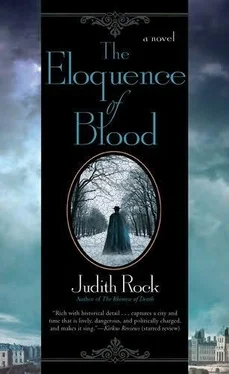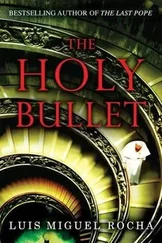Judith Rock - The Eloquence of Blood
Здесь есть возможность читать онлайн «Judith Rock - The Eloquence of Blood» весь текст электронной книги совершенно бесплатно (целиком полную версию без сокращений). В некоторых случаях можно слушать аудио, скачать через торрент в формате fb2 и присутствует краткое содержание. Жанр: Исторический детектив, на английском языке. Описание произведения, (предисловие) а так же отзывы посетителей доступны на портале библиотеки ЛибКат.
- Название:The Eloquence of Blood
- Автор:
- Жанр:
- Год:неизвестен
- ISBN:нет данных
- Рейтинг книги:5 / 5. Голосов: 1
-
Избранное:Добавить в избранное
- Отзывы:
-
Ваша оценка:
- 100
- 1
- 2
- 3
- 4
- 5
The Eloquence of Blood: краткое содержание, описание и аннотация
Предлагаем к чтению аннотацию, описание, краткое содержание или предисловие (зависит от того, что написал сам автор книги «The Eloquence of Blood»). Если вы не нашли необходимую информацию о книге — напишите в комментариях, мы постараемся отыскать её.
The Eloquence of Blood — читать онлайн бесплатно полную книгу (весь текст) целиком
Ниже представлен текст книги, разбитый по страницам. Система сохранения места последней прочитанной страницы, позволяет с удобством читать онлайн бесплатно книгу «The Eloquence of Blood», без необходимости каждый раз заново искать на чём Вы остановились. Поставьте закладку, и сможете в любой момент перейти на страницу, на которой закончили чтение.
Интервал:
Закладка:
Chapter 7
When Charles reached Louis le Grand, he took his turn at overseeing dinner for the pensionnaires and their tutors who hadn’t gone to the country house in Gentilly. During the holidays, the fully professed Jesuits usually ate separately, in the fathers’ refectory, leaving the scholastics like Charles to take turns overseeing student meals. It was a small group, and both younger and older boys ate together in the older pensionnaires’ dining hall. Today’s dinner, for which Charles had little appetite, was a savory mutton gallimaufree. A half dozen braziers had been brought in as an extra holiday treat, though in the vast room, no one sitting more than a few feet from one felt any warmth. But at least their orange glow was pleasant to see on a dark, snowy day and made the ceiling’s faded gold stars shine between its dark beams.
When dinner was over and the refectory empty, Charles went to Pere Le Picart and told him what he’d learned at the Chatelet and the Brion house. The rector demurred at the idea of Charles scouring the city’s coffeehouses and reluctantly decided to give the notary one more day to appear on his own.
“I have thought of something else I could do this afternoon in regard to this, mon pere, if you permit,” Charles said. “I keep thinking about the classes beginning on Monday and all that will then be upon us.”
“What do you want to do?”
“I would like to talk to Maitre Richaud. He went with me to the Place Maubert yesterday to call on a chandler from the artisans’ Congregation of the Sainte Vierge. He may have heard something about the Mynette household, or about Henri Brion.”
“That is well thought.” Le Picart frowned briefly. “I believe-yes, I am sure you will find him just now in the first house on the right in the student court, in the bedding closet.”
Startled-not for the first time-at Le Picart’s minute knowledge of who was doing what in his domain, Charles went through the Cour d’honneur and through an archway into the next courtyard to the north, the student court. The bedding closet was a small, windowless room on the ground floor, where sheets and blankets were kept in old wooden chests and newer cupboards with tall doors. Maitre Richaud was indeed there, muttering to himself with his nose nearly touching a heavy linen sheet.
“Holes? How am I supposed to see holes in pitch dark?” He lifted the sheet higher and turned slightly toward the open door.
“You could light a candle,” Charles said mildly from the doorway. “Unless, of course, you prefer to curse the darkness…” A strong scent of lavender and wormwood, specifics against moths-and probably also unwelcome to nesting mice-came from a chest whose lid stood open.
“We’re told to save candles.” Richaud looked up irritably. “Oh. It’s you. Well, stand out of the light, if you can call it that.” He went back to examining the sheet.
“Want help?”
Richaud grunted, and Charles pulled a sheet from the open chest. “The other morning, when we went to the Place Maubert,” Charles began, “did you-”
“Look at this! The entire middle is gone! What do they do, stick swords through them?”
“Can’t it be mended?”
“Oh, I suppose so.” Richaud threw the sheet into a pile on the floor and picked up another. “What about the Place Maubert?”
“While you were with your chandler,” Charles said patiently, “did you hear any talk about the Brion family on the rue Perdue? Or about a Mademoiselle Martine Mynette?”
“The one who’s dead?”
“So you know that. How?”
“Probably everyone in the college knows it. Once the porter at the postern door hears, everyone knows. Of course, I don’t listen to gossip,” Richaud added repressively, and nodded with satisfaction-whether at the sheet he held or his own uprightness, Charles couldn’t tell.
Keeping a firm grip on himself, Charles said mildly, “If someone gossiped beside you-in the chandler’s shop on the Place Maubert, say-how could you help hearing it?”
“You’re the one who went to the Brion house, Maitre du Luc. And they knew the Mynette girl, so I heard, and knew her very well. Why are you asking me about these people?”
Charles cast his eyes up, glad of the dim light. “Because gossip and what people say of themselves and their closest friends are not often the same thing. And because I’ve been directed to ask, if that salves your conscience.”
Richaud’s eyes slid sideways toward Charles. “What kind of gossip?” He dropped another sheet onto the pile and picked up a stack of neatly folded sheets.
“Any kind,” Charles said, stifling the urge to tear a strip off a discarded sheet and strangle Richaud with it.
“Well… I did hear something.” Richaud dumped his stack of sheets into the open chest. “About the Brion son,” he said, straightening. “Gilles, he’s called.”
Charles nodded encouragingly.
“He hated that Mynette girl. Because his father was making him court her and he didn’t want to, he wants to be a monk.”
“A monk?” Charles said in surprise. Well, that explained a lot.
“But his father won’t give him an endowment to take to the monastery,” Richaud said. “Refused to give him anything at all unless he married the girl, who was supposed to get a lot of money after her mother died.”
“Oh?” Charles tried to keep his tone even. “Who told you this?”
“The chandler’s apprentice.”
Charles went on studying the sheet in his hands and considered what Richaud had just said about Isabel’s brother. Was it a motive for murder? An argument could be made either way. On the one hand, Martine would probably have had no qualms about opening the door to Gilles Brion. So he would have had easy entrance to the house if he wanted to kill her. But on the other hand, though Gilles might well have killed Martine in sudden desperation, his father would almost certainly try to force some other heiress on him. So what would taking such a terrible risk gain him in the end? Most people had few choices about their lives beyond what their parents chose for them. Even when they came of age, defying parental choice usually meant losing not only the means to live, but the social connections necessary to get on in the world. Parental will and family gain ruled everything.
Charles wondered if the neighborhood police commissaire knew about young Brion’s forced courtship of Martine. Probably, if even the neighborhood apprentices knew. But it wasn’t something to leave to chance.
“Thank you, maitre.” Charles thrust his bed sheet at Richaud and made for the street passage, leaving Richaud complaining loudly that he could at least have folded the sheet first.
But before Charles reached the postern, he was overtaken by a small crowd of teenage boys escorted by their tutors. The boys were all helping to carry a deep basket full of dark round loaves and piles of clothing.
“It’s time, maitre!” one of them said excitedly.
Charles had forgotten completely about overseeing the distribution of alms by these representatives of the older pensionnaires’ Congregation of the Ste. Vierge. With an effort, he swallowed his frustration at the delay in seeing the police commissaire and in finding Lieutenant-General La Reynie, for whom no detail of policing the city was too small and who might be anywhere in Paris. Charles dismissed the escorting tutors and followed the boys into the main building’s anteroom, where the big double doors opened directly onto the street. The boys brought a heavy walnut table from the neighboring grand salon, placed it before the doors, and piled the loaves and clothing on it. Then Charles drew them together to pray for God’s poor and ask the Holy Virgin to increase mercy and generosity in their own hearts. At the “amen,” two boys pulled the doors open to the snowy street. Everyone knew that alms were given out on Friday afternoons, but no one approached until the doors stood open. Charles pulled his cloak more tightly closed, wondering aloud if the weather might keep people away, but the boys all shook their heads.
Читать дальшеИнтервал:
Закладка:
Похожие книги на «The Eloquence of Blood»
Представляем Вашему вниманию похожие книги на «The Eloquence of Blood» списком для выбора. Мы отобрали схожую по названию и смыслу литературу в надежде предоставить читателям больше вариантов отыскать новые, интересные, ещё непрочитанные произведения.
Обсуждение, отзывы о книге «The Eloquence of Blood» и просто собственные мнения читателей. Оставьте ваши комментарии, напишите, что Вы думаете о произведении, его смысле или главных героях. Укажите что конкретно понравилось, а что нет, и почему Вы так считаете.












